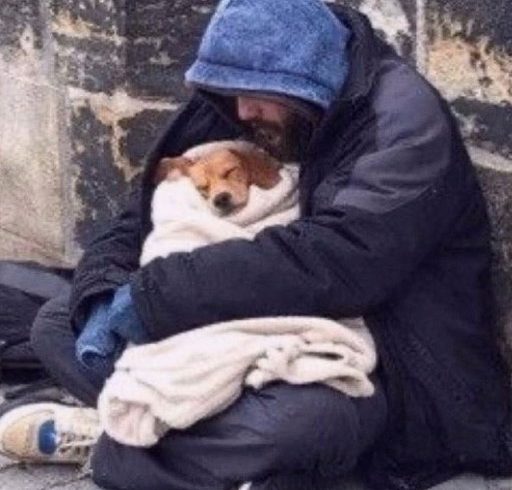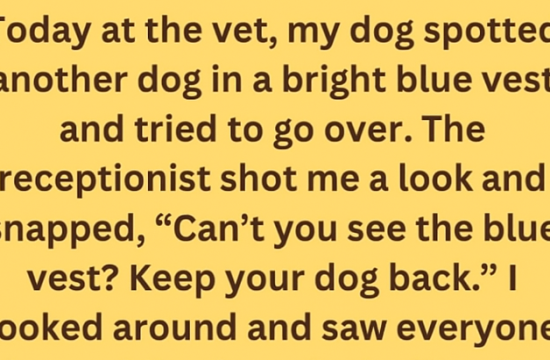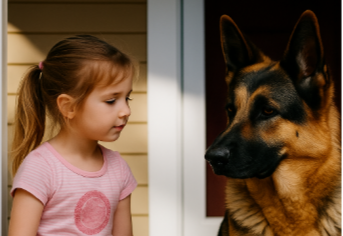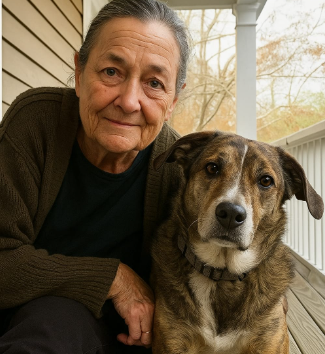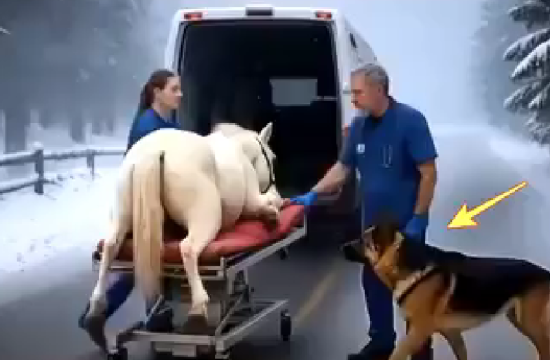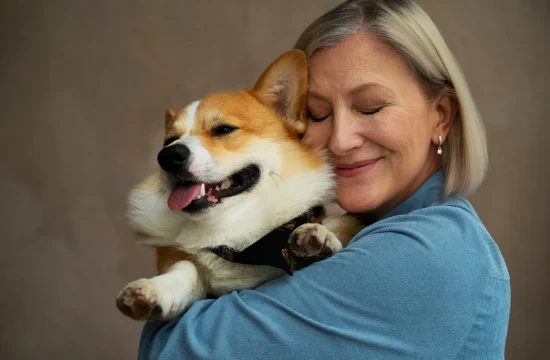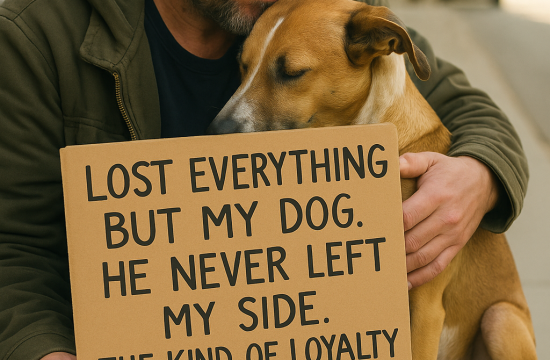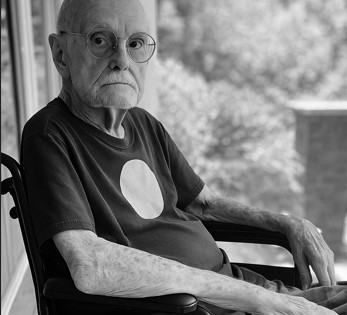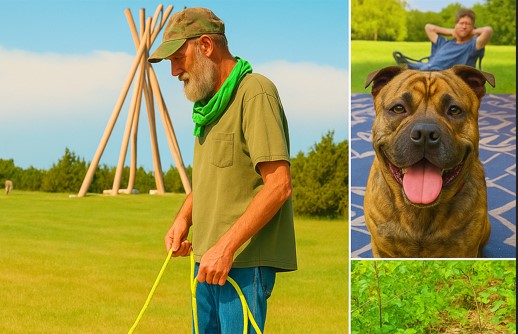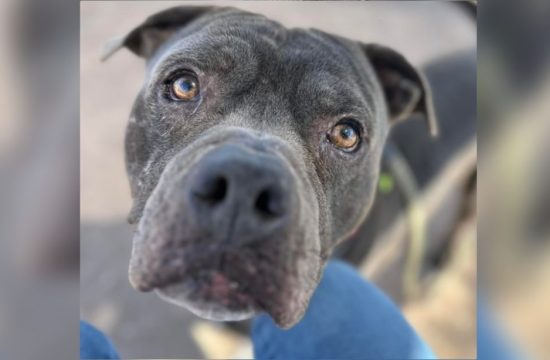Nights on the street are the worst when the cold creeps into your bones. I used to think I could handle it, but ever since I found Benny, things changed. He’s a scruffy little mutt, more fur than flesh, with these big, trusting eyes that look at me like I’m the whole world.
I found him curled up behind a dumpster six months ago, shivering, barely breathing. I couldn’t leave him. Maybe because I know what it feels like to have nobody.
I only have one blanket. It’s thin, fraying at the edges, but it does the job—most nights. Tonight, though, the wind cuts like a knife, and Benny won’t stop shaking. I wrap him up, tucking the fabric around his tiny body, while I press my back against the cold bricks of the alley. My fingers are stiff, my breath fogging in the air.
“Stay warm, buddy,” I whisper, even though I know he won’t understand. He just sighs and nuzzles into the warmth.
I close my eyes, trying to ignore the ache in my stomach. Sleep comes in fragments when you live like this—half-dreams mixed with reality, always ready to wake up at the first sign of danger.
Then I feel it—something soft draped over me.
I jolt awake, blinking up at a blurry figure standing over me. A woman. Mid-forties, maybe. She doesn’t say a word, just tucks another blanket around me. It smells clean, like fabric softener, like home.
I open my mouth to speak, but she just gives me a small nod and walks away.
I clutch the blanket, still warm from her hands, and for the first time in a long time, I don’t feel invisible.
I didn’t catch her name that night, but for some reason, her kindness lingers in my mind more than the cold. Benny seems to sense my shift in mood. He noses at my elbow, tail thumping against the concrete. Sometimes I think he’s telling me it’ll all be okay.
The new blanket is heavier, thicker, definitely warmer. That night, I wrap myself in it and hold Benny close, dozing off to the gentle rise and fall of his tiny chest. For once, the chill isn’t biting into my bones.
When morning comes, I wake to find Benny staring at me, ears perked, as if he’s waiting for instructions. My stomach rumbles in protest—I haven’t eaten since yesterday afternoon, and that was just a day-old doughnut someone handed me outside the coffee shop on Third Street.
Packing up my meager belongings is easy because I don’t have many: an old backpack, my thin blanket, and now this new one from the mystery woman. I pick Benny up and tuck him under my arm. He’s grown a little since I found him, finally putting on some weight. He licks my hand, and I can’t help but smile.
The city is already awake. Cars rush by, and people hurry along the sidewalks, sipping coffee and staring at their phones. I get the usual half-glances—some folks look away, embarrassed, while others barely acknowledge me at all. I’m used to it, but every day, it still stings a little.
I head toward the community center on Maple Street. Sometimes they serve a free breakfast—oatmeal, toast, maybe some fruit if I’m lucky. Benny’s not allowed inside, but I can usually get something to-go for him as well.
When I arrive, I see a short line forming. As I wait, I notice that same woman from last night coming out of the center, arms full of boxes. She must be volunteering. Before I can think twice, I clear my throat and speak up.
“Ma’am?” My voice cracks from disuse.
She turns around slowly, her eyes flicking to me, then to Benny. At first, I’m worried she might not recognize me in the daylight, but then a small smile forms on her face.
“Oh,” she says. “You’re the man from the alley. How’s your pup?”
“Better, thanks to you,” I reply, rubbing Benny’s head. “You gave me a blanket last night. I just…wanted to say thank you.”
She fidgets with the boxes in her arms. “It was nothing, really. It’s the least I could do.”
I hesitate, unsure if I should ask her name or just let her go about her business. Finally, curiosity wins out. “I’m Marcus, by the way,” I say.
She shifts the boxes so she can extend a hand. “I’m Beth.”
I nod, feeling a wave of relief. Sometimes just learning someone’s name breaks down the walls of feeling like a complete outcast. “Thanks again. You saved me—and Benny—a very cold night.”
Beth glances at the line of people waiting for breakfast and then back at me. “Why don’t you go inside and get something to eat? I’ll be here a while, handing out supplies.”
I scratch my chin, remembering how most places won’t let Benny in. “Well, I—”
She lifts a finger as though reading my mind. “Take a seat on that bench outside, and I’ll bring you something. The center’s strict about animals, but I can pack up a plate for you if you promise to stay put.”
My heart surges with gratitude. “Really? That would mean a lot.”
She nods, and for the first time in a long time, I feel like someone genuinely cares about my well-being.
Beth brings out two plates of warm oatmeal, toast, and some scrambled eggs. She even managed to snag a small paper bowl for Benny. I lower it to the ground, and he wolfs it down as though he hasn’t eaten in a week. I eat more slowly, savoring each bite.
Beth sits down beside me, a careful distance away, but close enough that we can talk. “How long have you been…out here?” she asks gently.
I shrug, staring at the plastic fork in my hand. “Off and on for a couple of years. Had a place for a while, but lost my job, then fell behind on rent. You know how it goes.”
She nods. “Times are tough. The community center has programs to help people get back on their feet—job training, temporary shelter leads. Have you checked any of those out?”
“Sometimes they have a waiting list,” I say, trying not to sound bitter. “And most shelters don’t allow pets. I can’t leave Benny behind.”
She looks at Benny, who’s licking the last bit of eggs from his bowl. “He’s your family, right?”
I nod, my throat tightening. “Yeah. Only family I got.”
Beth sets her plate aside, thoughtful. “There’s a new pilot program a few blocks from here. I heard they’re making exceptions for people with service animals or emotional support animals. You might qualify if you get Benny registered. It won’t be immediate, but it’s a start.”
My mind races. Could this actually be a chance for something better?
Before I can thank her, she’s already rummaging in her bag for a slip of paper. She jots something down and hands it to me. “That’s the address, plus my cell number. If you need help getting there, or if they give you a hard time, call me.”
It takes me a second to find my voice. “Why are you—why are you doing this?”
Beth shrugs. “I’ve been helped before when I needed it. Just paying it forward.”
After we finish eating, Beth heads back inside to continue volunteering. I slip the piece of paper into my pocket and gather my things. Holding Benny close, I make my way across town. The wind is still cold, but the morning sun offers a bit of warmth as I weave between pedestrians and street vendors.
The address Beth gave me leads to a small office building with a sign out front reading “Second Chances Initiative.” There’s a reception desk just inside the glass doors, and I step in cautiously, worried I’ll be turned away the moment they see the dog in my arms.
“Can I help you?” the receptionist asks politely, eyeing Benny with curiosity.
I clear my throat. “I—I’m looking for information on a pilot program. A friend told me you might allow pets if they’re registered as emotional support animals.”
She slides a clipboard across the desk. “You can fill out an application here. We have a few short questions, and then we’ll schedule an evaluation. Do you have any ID?”
My heart sinks. I lost my ID months ago. “I don’t, but I can try to get one. I have a birth certificate somewhere in storage. It’s complicated.”
She smiles, surprisingly understanding. “We have resources to help with documentation. You’ll need an ID eventually, but we can get started without it. Just do your best on the form.”
It’s a short set of questions—name, age, health concerns, how long I’ve been homeless. I list Benny as an emotional support dog, half expecting them to laugh me out of the building. But no one does. The receptionist thanks me and says they’ll be in touch soon to schedule the next step.
“Is there a waitlist?” I ask, trying to keep the desperation out of my voice.
She glances at her computer. “We do have a small waitlist for the transitional housing spots. But we’ve moved a few people through the program already, and some rooms should open up soon. I’d say give it a couple of weeks at most.”
Two weeks. It feels like an eternity on the street, but it’s still the most hopeful timeframe I’ve heard in ages.
That night, the temperature drops again. The forecast says it could snow. I find a sheltered spot under an overhang behind an old bookstore that’s been closed for months. Benny and I huddle under both blankets, but the wind whips around the building, cutting through the fabric. My fingers and toes start to go numb.
I realize with a jolt of panic that if it really does snow, this spot won’t be enough. Memories of last winter flood my mind—sleeping behind grocery stores, waking up with frost on my hair. I can’t go through that again. And Benny definitely can’t.
I remember the phone number Beth gave me. My fingers shake as I pull out the slip of paper. If I call her, am I crossing a line? She said to reach out if I needed help, but this feels like more than just trouble with paperwork.
As the wind howls, I pull out the old prepaid phone I keep for emergencies. It’s got just enough battery to make a short call. With a trembling hand, I dial Beth’s number.
She picks up on the second ring. “Hello?”
“Beth, it’s Marcus…we met at the community center. I’m—I’m sorry to bother you so late, but I’m in a bad spot. The cold’s getting worse.”
She doesn’t hesitate. “Where are you?”
I give her the address, feeling a swirl of relief and embarrassment. She tells me to hang tight. Her voice is calm, steady, like she’s used to being the one people rely on.
Within half an hour, a small pickup truck pulls around the corner. Beth steps out, wearing a heavy coat. She motions for me to get in. I pick up Benny, gather my blankets, and climb into the passenger seat, letting the warmth of the heater wash over me.
“Thank you,” I manage, my breath still unsteady.
Beth just nods and puts the truck in gear. “I talked to someone at a local shelter that occasionally makes exceptions for dogs if the owner is actively working on getting housing. They’re not well-known, so they don’t always have a full house.”
I clutch Benny close, feeling a surge of hope. “Do you think they’ll really let me stay?”
She shoots me a small, reassuring smile. “We’ll find out.”
We drive through the city streets until we reach a modest brick building with a sign that reads “Oakside Haven.” It’s not much to look at—peeling paint around the doors, and the steps are a little worn—but it’s a roof.
Beth accompanies me inside, speaking quietly with the woman at the front desk. Benny shifts in my arms, ears up, as if he can sense something important is happening.
After a few minutes, Beth calls me over. “They have a bed for a few nights, as long as you keep Benny by your side. You’ll need to show them you’re enrolled in a program to get stable housing—that’s where the Second Chances Initiative can help.”
My heart pounds. A few nights inside—maybe long enough to get the paperwork settled, maybe long enough to get a real start. I nod so hard my neck hurts. “I can do that. Thank you.”
Beth gives me a quick hug, taking me by surprise. “I’ll check on you tomorrow. Take care of yourself, okay?”
That night, I sleep on a narrow cot with Benny curled up at my feet. The room is small and shared with another man, but it’s heated. There’s a washroom down the hall with hot water—luxuries I haven’t experienced in who knows how long. I drift off to the hum of the ventilation, a gentle noise compared to the city traffic and the howling wind.
Over the next few days, I work with the Oakside Haven staff to finalize my registration for the Second Chances Initiative. Beth keeps her promise, visiting me, helping me file the necessary documents. Between her efforts and my own determination, I’m finally approved for transitional housing. A small unit, just me and Benny. It’s not fancy, but it’s ours. A door that locks, a bed, a tiny kitchenette, and a bathroom. It feels like a palace.
I nod, swallowing hard. “Yeah. I will.”
Benny jumps onto the small couch, settling himself in a sunny patch of light coming through the window. For the first time in ages, I feel grounded. Not out on the streets, not scrounging for the next meal, but actually standing on solid ground with a chance to move forward.
It’s easy to believe that one small act of kindness won’t matter. But Beth’s single gesture—offering me a blanket on that cold night—didn’t just warm my body; it reminded me that I wasn’t invisible. It sparked a chain of events that led me here: a roof over my head, a fresh start, and a future that might finally hold something other than day-to-day survival.
We often don’t realize how powerful our small kindnesses can be. A warm blanket, a simple conversation, a phone number to call—these can be lifelines for people who’ve lost their footing. When someone feels seen, it can give them just enough hope to take the next step.
And if there’s one thing I’ve learned, it’s that no matter how rough things get, you don’t have to face it alone. Whether it’s a scruffy dog that becomes your closest friend or a caring stranger who extends a hand, sometimes the smallest gestures light the way to a whole new beginning.
If this story touched your heart, please share it with someone you care about. And if you believe in the power of kindness to transform lives, go ahead and like this post—every bit of support can help spread a message of hope. Who knows? Maybe you’ll be the next person to spark change with just one simple act.

